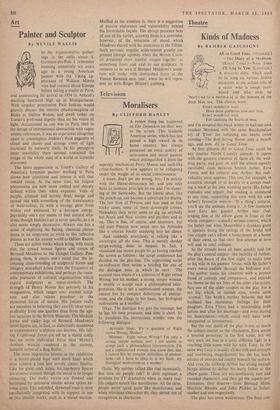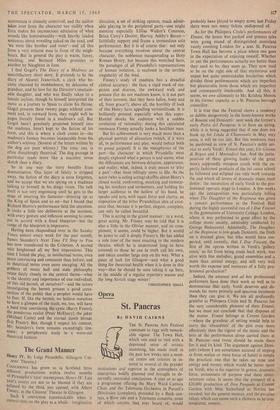Theatre
Kinds of Madness
By BAMBER GASCOIGNE
All in Good Time. (Mermaid.) --the Diary of a .Miadritan. (Royal Court.)—Ne,I time I'll Sing to You. (Criterion.)
A KubsiNG ditty, which used Evoe! wonderful ways Have these goddesses now and then, Evoe! wonderful ways For subduing the hearts of men,
and I'm tempted this bleak winter to hail our own resident Mermaid with the same Bacchanalian cry of 'Evoe' for subduing our hearts twice running—The Bed Sitting Room only a month ago, and now All in Good Time.
At first glimpse All in Good Time could be
any routine North Country comedy. It opens with the greatest chestnut of them all, the wed- ding party, and goes on with the almost equally inevitable clash between brutish father, Ezra Fitton, and his cultural son, Arthur. But indi- viduality soon appears. This son, for example, is eccentric enough to sit quietly in a corner read- ing a book at his own wedding party. His father explodes and argues that reading is unnatural at any time, supporting this view with his own father's favourite maxim-1f a thing's natural, you'll see the animals doing it.' A few moments later Ezra has goaded Arthur into chal- lenging him at the elbow game in front of the whole company—a deadly serious contest, which the father just wins. Meanwhile a drunken guest is upstairs fixing the springs of the bridal bed (the couple can't afford a honeymoon or a home of their own), so that their first attempt at love will end in total collapse.
So the strands have all been quickly laid for the play's central subject—the inability of Arthur, after the fiasco of the first night, to make love to his wife in his parents' house, with his father's every move audible through the bedroom wall. The author treats his situation with a perfect blend of comedy and compassion, and extends his theme to the sex lives of his other characters. Not one of the older couples in the play has a sex life which, to outside eyes, would seem `normal.' The bride's mother believes thtt her husband has incestuous feelings for their daughter. Ezra Fitton had a relationship both before and after his marriage—and even during his honeymoon—which could well have been interpreted as homosexual.
But the real merit of the play is not so much the subject-matter as the characters. Ezra seems a boorish prototype in the first scene, but we very soon see him in a quite different light in a touching little scene with his wife, Lucy. In the same way Lucy is usually all warmth and strength and mothering magnificence, but she has black streaks of unexpected cruelty beneath the surface. And even the milksop ArthUr has strong enough biceps almost to defeat his burly father at the elbow game. These are extraordinarily real and rounded characters, and they get the superb per- formances they deserve—from Bernard Miles, Marjorie Rhodes and John Pickles as father, mother and son respectively.
The play has some weaknesses. The final con-
summation is clumsily contrived, and the author takes over from the character too visibly when Ezra makes his unconscious admission of what sounds like homosexuality—with heavily loaded sentences about wrestling naked on the sand, and 'we were like brother and sister'—and all this from a very reticent man in front of the neigh- bours, But in general the play is warm, funny, touching; and Bernard Miles promises us another by Naughton in June.
I find Gogol's The Diary of a Madman an unsatisfactory short story. It pretends to be the diary of Aksenti Ivanovitch, a clerk who be- came obsessed by snobbishness, by delusions of grandeur, and by love for the Director's unattain- able daughter, and who was finally taken to a lunatic asylum, though he himself interpreted the move as a journey to Spain to claim his throne. Gogol presents these twenty pages without com- ment and, in outward form, they might well be pages literally found in a madman's cell. But Gogol hasn't genuinely projected himself into the madman, hasn't kept to the fiction of his form, and this is where a clash comes in—the madman's fantasy becomes inseparable from his author's whimsy. (Several of the letters written by the dog are pure whimsy.) The tone, too, is often disturbingly theatrical. The dog passage in particular reads more like .a macabre revue sketch than a diary.
So in one way the story benefits from dramatisation. One layer of falsity is stripped away, the fiction of the diary is soon forgotten, and we accept that we are spying on a madman talking to himself in his dingy room. The talk itself is not very engrossing until he gets to the stage of enacting his fantasies—dressing up as the King of Spain and so on—but I found that Richard Harris's performance held the attention. It looks a little too deliberate at the moment, with every gesture and inflexion seeming to come pat in accord with a fixed blueprint—but the range of the blueprint is impressive.
Having been rhapsodised over in the Sunday Times almost every week for the past month, James Saunders's Next Time I'll Sing to You has now transferred to the Criterion. A second visit heightened all my first impressions. This time I found the play, in intellectual terms, even more convincing and consistent than before; and in theatrical terms even more enraging. All the gobbets of music hall and stale philosophy relate fairly closely to the central theme—what is the identity and importance of one individual, of this old hermit, of ourselves?—and the actors investigating the hermit present a good cross- section of the public that a prophet would have to face. If, like the hermit, we believe ourselves to have a glimpse of the truth, we, too, will have a hard time convincing the cynic (Barry Foster), the ponderous realist (Peter McEnery), the joker (Michael Caine) and the eternal dumb blonde (Liz Frazer). But, though I respect his content, Mr. Saunders's form remains exceedingly tire- some: a periphrastic study in a worn-out theatrical fashion.



































 Previous page
Previous page